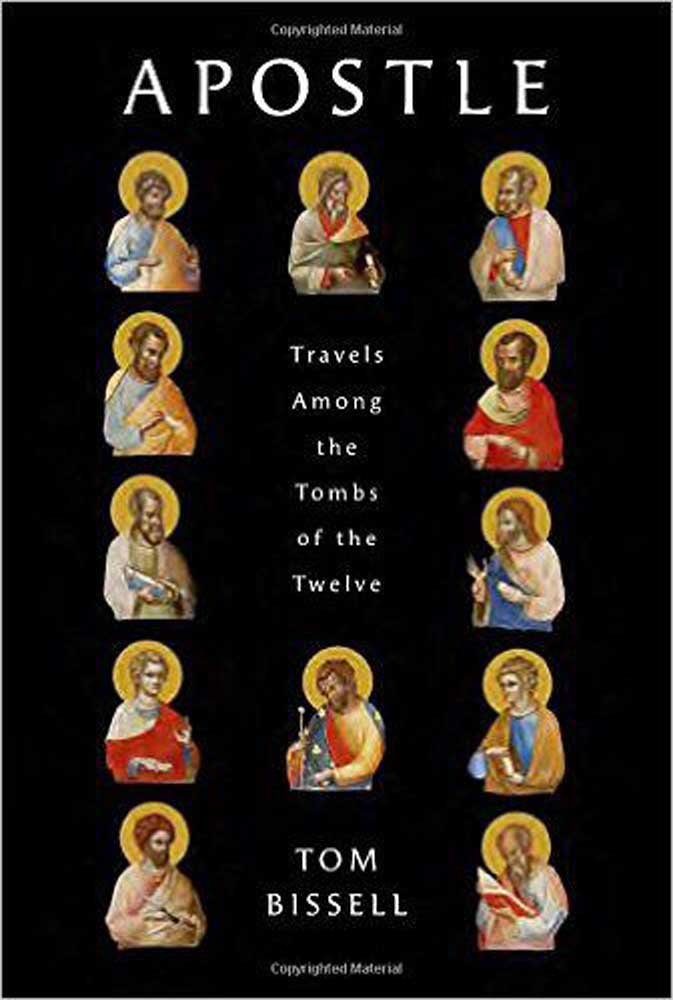Tom Bissell’s ‘Apostle’ takes a trip into faith, history and skepticism
Published 12:00 am Sunday, April 17, 2016

- Tom Bissell’s ‘Apostle’ takes a trip into faith, history and skepticism
“Apostle: Travels Among the Tombs of the Twelve” by Tom Bissell (Pantheon, 432 pages, $28.95)
The life and legacy of the apostle Thomas were a shimmer of myth and fact that sent Tom Bissell across oceans and down alleys; he scribbled notes with a high fever and cried with dysentery and diarrhea in a church bathroom on a mountaintop in India.
In researching his new book, “Apostle,” Bissell, a writer of wanderlust and obsessed curiosity, spent years hunting the supposed tombs of disciples who for centuries have been gauzed in ecclesiastical mist, including Thomas the doubter, whose bones and relics have been scattered from Rome to Kerala, India.
“Apostle” is a ride-along through unanswerable questions about 12 imperfect men who set out in the first century to spread the word of Jesus Christ. The story glows with enchanting asides and stitches together how Jesus’ life and meaning were edited and refined through the ages from contradictory accounts and incongruous translations.
“What Christianity promises, I do not understand,” Bissell writes. “What its god could possibly want, I have never been able to imagine, not even when I was a Christian.”
“Apostle” was a fitting undertaking for a fallen altar boy, beleaguered Peace Corps volunteer, adventure journalist and writer whose short fiction delights in the mishaps of expat Americans navigating foreign lands. When discussing the book the other day, Bissell, veering from biblical legends to primal urges, smiled like a man who had overheard an indiscreet whisper.
“Apostle” started as a critique of what Bissell regarded as nonsensical beliefs predicated on apocryphal yarns that included talking animals and necrophilia. Early Christian stories written before the New Testament, he said, were the “first fan fiction.” Deciding, however, that ridicule might not make a good thesis, Bissell amassed thousands of pages of text and visited nine countries in a study that blends travelogue with a vivid mosaic of emperors, evangelists and schisms that bent the course of history.
“The book is about not only Christian storytelling but storytelling in general and the meaning we arrive at through characters we create and then send hurtling through time, whether they’re fiction characters in a novel or Christian characters of legend,” said Bissell, who has written for the New Yorker and other magazines. “The weirdness of Christianity felt like an important thing to communicate.”
The genesis of “Apostle” began when Bissell was a high school junior writing a report on Jesus that led to his realization that a true understanding of God seemed impossible. He left the Catholic Church, but Christianity continued to resonate. In his 20s he toyed with a doomed novel about the apostle John; later he found wonder in religious archaeological sites even as Christianity’s central tenant remained as insubstantial as a dream.
“What Christianity promises is eternal life. That I get,” he said. “But you get there through a very winding, complicated path, and to me the path is so complicated and so winding that the eventual destination of eternal life seems pretty dubious. … It’s like a gift shop at the end of a really interesting museum experience.”
Bissell, 42, is a writer of magpie instincts, a man seeking enlightenment amid strangers in distant geographies. His entourage of translators, drivers, a monk, an archaeologist and assorted pilgrims are, like the apostles, colloquial and universal, restless and oblivious souls that are at once amusing and profound. His short-story collection “God Lives in St. Petersburg and Other Stories” is map of such characters, and his memoir, “The Father of All Things: A Marine, His Son and the Legacy of Vietnam” is a study of personal sacrifice and national transgression.
“Apostle” follows the vein of how a contentious religious past resounds in the present. Bissell examines John’s legend in Turkey, traverses Kyrgyzstan looking for the ruins of an Armenian monastery devoted to Matthew and walks 500 miles across Spain where he writes with a degree of skepticism that James’ tomb was “rediscovered in the ninth century.” In Israel, Bissell looks for the place where Judas committed suicide after betraying Jesus, wondering why an omniscient God would turn the apostle into a pawn who would endure endless scorn.
The book recounts early Christian debates over the divinity of Jesus and the concept of the Holy Trinity. It clamors with voices and agendas; the discarding of some gospels and the inclusion of others until the Church — like a good Netflix series — had distilled its narrative. Bissell is enamored with Paul, an apostle but not one of the original 12, whose eloquent preaching and letters set the church’s painful evolution away from its Jewish roots to a Gentile Christianity.
“Paul had inexplicable confidence,” he said.
“One of the great mysteries of early Christianity is Paul’s ability to virtually look the original followers of Jesus in the eye and say ‘wrong.’ And not only that but to win the argument.”
Bissell’s summation of the gospel writers had the ring of a book critic: “Mark is pretty much an idiot. … Matthew was a much more capable storyteller. … Luke knew how the Greco-Roman world worked. He’s the only proper gentleman scholar of the gospel writers. … John seems to have come from another planet altogether. His is the purest writer’s gospel, it’s also the most symbolic.”
But what writer wouldn’t forsake all he owned to have his work read 2,000 years after his death? All about a sandaled preacher who roamed hillsides, performed miracles, was arrested, beaten and crucified, and ascended into heaven.
Bissell questions the truth and veracity of most of it, but he concedes it is a pretty story.
“Take Jesus out of the compelling matrix of the narrative and he’s just another rabble-rousing, wanna-be prophet,” he said. “There’s something to be said for the power of the gospel writers and how they fashioned something that ignited their world.”






